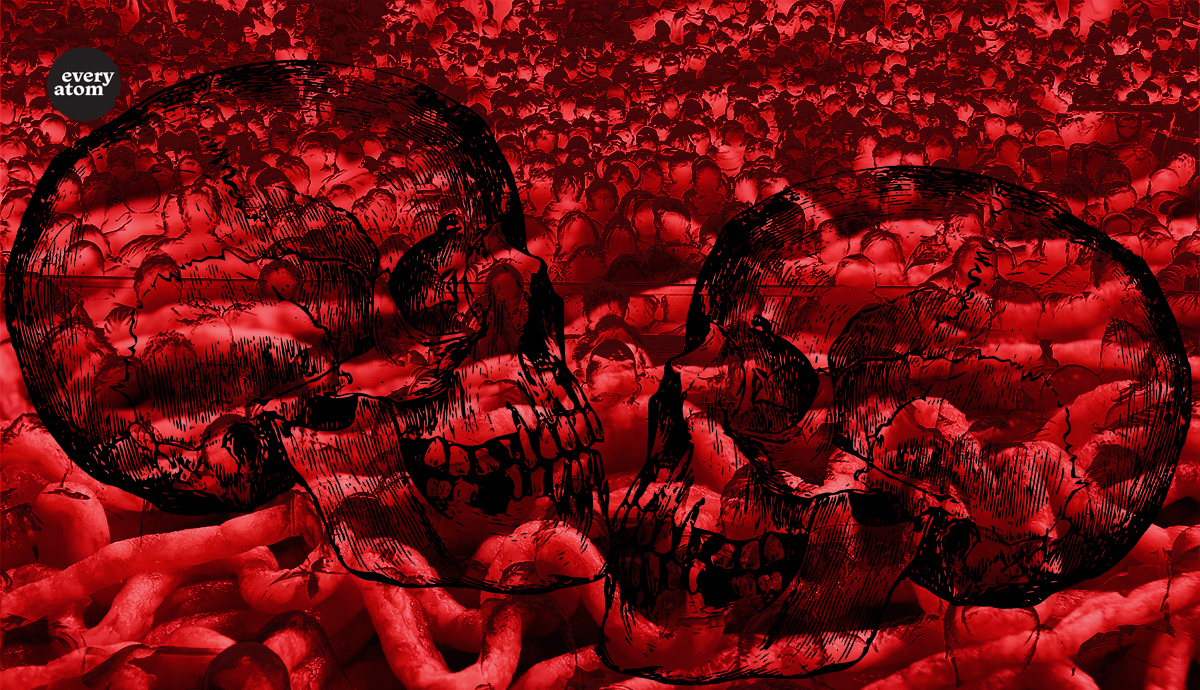Every Atom | No. 177
Introduction to Every Atom by project curator Brian Clements
In this line from the poem that would later be titled “Song of Myself,” Whitman poses a seemingly simple question with an expansive answer, asking us as readers to imagine the place of our human bodies in food chains, ecosystems, and the overall rhythms of the universe. He asks us to see ourselves as inhabitants in a world in which neither we nor those we love ever really die; all of us, he argues, simply become otherwise and anew. In what Whitman presents as a perpetual and beautiful cycle, the farmer’s cow in the field eats the grass and the plants. The body of the cow, muscle and meat, is divided into pieces, and the beef is cooked and prepared for the plate. The beef, in turn, feeds the poet, as well as the working men catalogued throughout the poem. For Whitman, those who consume and “extract strength from the beef,” drive the stages, swing the mallets, and turn over the pages of his book throughout the span of their days, and upon reaching the limits of a human lifetime, the meat, the “fat,” and the bones of the human body that Whitman praises so unabashedly, return to the ground, decomposing and recomposing into the dirt beneath our boot-soles. In his view, we become the soil that feeds the grass—not only the blades that are chewed by another generation of cows—but also that thick vegetation that spirals and sprawls across the cover of Leaves of Grass (1855). The question Whitman poses, then, gets at the heart of the making of Leaves of Grass and its readers, in all senses of those terms.
But in light of the recent recovery of Whitman’s thirteen-part journalistic series “Manly Health and Training”—published in the New York Atlas in 1858, just three years after the publication of the first edition of Leaves—it is hard not to see this poetic meditation on beef as the precursor to the dietary advice Whitman dispenses in his articles. “Manly Health and Training” reads at once like a self-help guide and an athletic trainer’s pep talk that is intended to set readers on the path toward getting the strong, healthy bodies and achieving the long lives they have always wanted. At its core, the series is a diet and exercise manual for a male readership, in which Whitman recommends, “Let the main part of the diet be meat, to the exclusion of all else,” emphasizing his eating plan as “an almost exclusive meat diet.” Whitman goes on to argue that dinners should consist of lightly cooked lean beef or mutton from which the fat has been removed, and he advises against pepper and other seasonings because they could lead to indigestion, or, as he calls it, the “Great American Evil.” It was Whitman’s insistence in “Manly Health” that his readers should be extracting their strength from beef and other proteins that prompted several journalists announcing the recovery and republication of the series in 2016 to present Whitman as a champion of a high-protein and proto-paleo diet.
But Whitman does not simply offer dietary advice, in “Manly Health,” he becomes in this series what he refers to in Song of Myself as a “teacher of athletes” by presenting health as a condition that follows only from appropriate conditioning across the course of a whole lifetime rather than for a specified period in preparation for a one-time athletic contest. The men that Whitman holds up as specimens of health in his journalistic series include some of the very men that appear in his catalogues in Song of Myself, namely the mechanics, drivers, and lumbermen that he encounters in his daily life in New York. Those readers that choose to beef up by following the Whitmanian plan detailed in “Manly Health,” embark on a training-for-life program, seeking through exercise and a meat diet, the strength of these hard laboring men that Whitman admires and celebrates in his poems.
Whitman’s emphasis on diet and health in both Song of Myself and “Manly Health and Training” help him to fulfill his promise to be “good health” to his readers and to live up to his proclamation that he is “the poet of the body.” The poet’s deep investment in the care and keeping of the physical body also speaks to his understanding of the role of the individual in the formation of larger social and democratic bodies, such as communities, states, and nations. Whitman ultimately sees in the extraction of strength from beef both a phase in the cycle of life and a vital aspect of a training program designed to improve the health and extend the lives of his readers. It is through this Whitmanian program of health and conditioning that he aims to play a key role in shaping the citizens-readers that he hopes will not only ensure the survival of a robust national democratic body but will also carry his legacy as America’s poet and personal trainer into the future.
Recommended
Nor’easter
Post-Op Appointment With My Father
Cedar Valley Youth Poet Laureate | Fall 2024 Workshop







